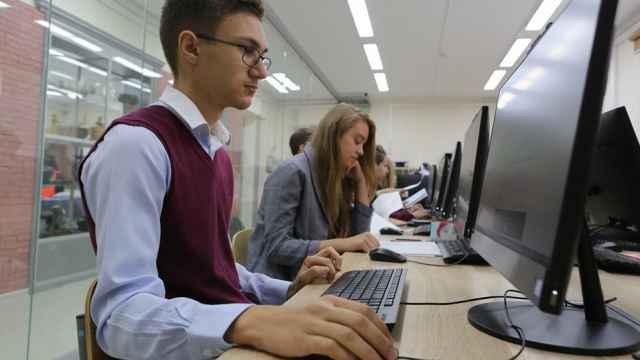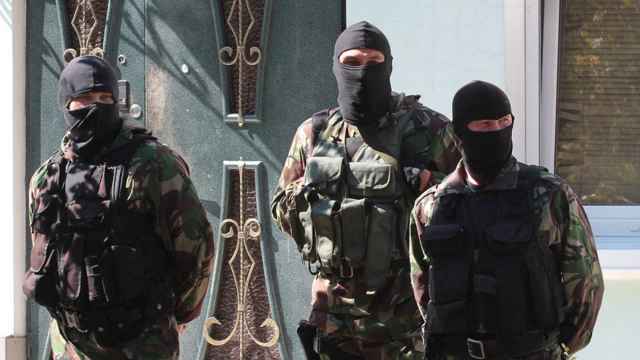“Digitalization” has become a worldwide catchword as of late.
This trend has equally caught on in Russia, where the development of the digital economy was set as a key priority. Under the national digitalization program, funding is expected to exceed $25 billion by 2024.
By then, Russia’s digital economy should count towards 5.1 percent of its GDP. Technological enthusiasm among officials and IT experts is understandable given the size of the Russian economy and high concentration of specialists in the sector. However, Russia’s digitalization is at a setback from being fully implemented, subject to the whims of its policy-makers. These preferences greatly affect Russia’s use of digital technologies.
In January 2018, during the annual Gaidar forum, German Gref, the CEO of Sberbank and major proponent of digitalization among Russia’s leaders, not only proclaimed the slogan “Government as a Platform” but also proposed to the audience present that they vote for methods presented for keeping Russian state officials accountable of.
The share of those participants, who opted for the use of online platforms exceeded 57 percent, while only 11 percent preferred representative democracy.
These numbers reflect high hopes (for Russia’s technocratic policy reformers) on the positive effects of digital technologies as a mechanism for improving the quality of Russian governance.
That is, while the turn towards democratization looks unrealistic and risky in the eyes of Russian state officials, the replacement of certain bureaucratic tendencies by algorithmic programs sound like an attractive and promising solution. In other words, the digitalization of Russian state governance is perceived by technocrats as a substitute rather than a complementary solution to the (political) democratization of the country.
Such an approach is not entirely new. During the Cold War, the World Bank and other international donors advanced technocratic policies in many authoritarian Third World countries, fearing that their democratization would otherwise contribute to a Communist takeover.
Meanwhile the Soviet Union invested in “scientific-technological progress” as a (possible) means of correcting the numerous errors of Communist state officials. And yet, these projects provided few returns, due to the political constraints imposed by the rulers of the respective states.
In the twenty-first century, the fundamental problems of the Russian state and its poor quality governance are caused not by outdated technologies but by the priorities of its leaders, who consistently sustain the politico-economic order of bad governance, based on corruption and rent-seeking. This is why Russia’s digitalization agenda a may at best result in partial improvements in certain state-sponsored top priority programs, known as “pockets of efficiency” rather than major political changes. These programs, however, had limited multiplicative effects and were often short-lived, quite apart from unsustainable.
Nowadays, digitalization in Russia is beset by political challenges, namely linked to the country’s growing (self-imposed) isolation amid ongoing confrontations with the West.
The threat perceived by Russia’s rulers, obsessed with security concerns, has greatly contributed to creating numerous barriers for Russia’s technological development. The unsuccessful ban of the messenger app Telegram and attempt to build a Chinese-style firewall (for autonomous state-censored Internet) are just two examples of this.
These efforts will not only expend a tremendous amount of resources (and enrich state contractors in the process), they will most likely also stunt the country’s digitalization, especially given that Russia’s aging rulers are not too sophisticated when it comes to the use of IT in their everyday lives.
They are inclined to consider new technologies as a tool for domestic control and international weaponry, rather than a mechanism for the development of the economy and (positive) instrument for society.
Instead of a technocratic utopia consisting of best algorithmic practices and digital communications between the state, business, and society, Russia may turn into a kind of dystopia of the Brave New Digital World.
In the worst-case scenario, the “government as a platform” will use high-tech devices for the full-scaled monitoring of its citizens’ behavior and for preempting ‘political risks’. Against the backdrop of the failure of Kremlin-sponsored candidates to win at the recent subnational elections, it’s easy to understand why one might favor the use of algorithmic technologies for voting, albeit with the special arrangements, which will exclude electoral outcomes, undesired by the Kremlin.
Alternatively, while Russian state officials discuss the possibility of (further) constitutional changes in Russia, why not consider an algorithmically driven referendum which would result in a new constitution, ensuring Putin’s presidency for life?
In the international arena, hackers have already become infamous as a powerful Russian meddling weapon, most notably in the U.S. presidential elections, and there is, therefore (presumably) a strong incentive for Russia’s rulers to invest more into technology for the development of new success stories relating to the systematic misrepresentation of Western adversaries.
And although a ‘war’ with hackers is less damaging than the use of nukes, it can hardly be regarded as a positive step towards Russia’s development.
Digitalization is still nevertheless an important governing mechanism in twenty-first century Russia, for those who use or abuse advanced technologies for their ideas and interests.
But without a major overhaul of the country offline, technology alone won’t save the country.
A Message from The Moscow Times:
Dear readers,
We are facing unprecedented challenges. Russia's Prosecutor General's Office has designated The Moscow Times as an "undesirable" organization, criminalizing our work and putting our staff at risk of prosecution. This follows our earlier unjust labeling as a "foreign agent."
These actions are direct attempts to silence independent journalism in Russia. The authorities claim our work "discredits the decisions of the Russian leadership." We see things differently: we strive to provide accurate, unbiased reporting on Russia.
We, the journalists of The Moscow Times, refuse to be silenced. But to continue our work, we need your help.
Your support, no matter how small, makes a world of difference. If you can, please support us monthly starting from just $2. It's quick to set up, and every contribution makes a significant impact.
By supporting The Moscow Times, you're defending open, independent journalism in the face of repression. Thank you for standing with us.
Remind me later.








